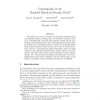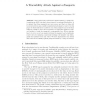25 search results - page 2 / 5 » Breaking a Cryptographic Protocol with Pseudoprimes |
SIAMCOMP
2008
14 years 10 months ago
2008
We initiate the study of two-party cryptographic primitives with unconditional security, assuming that the adversary's quantum memory is of bounded size. We show that oblivio...
ASIACRYPT
2008
Springer
15 years 1 months ago
2008
Springer
The collision-resistance of hash functions is an important foundation of many cryptographic protocols. Formally, collision-resistance can only be expected if the hash function in f...
FC
2010
Springer
15 years 3 months ago
2010
Springer
Since 2004, many nations have started issuing “e-passports” containing an RFID tag that, when powered, broadcasts information. It is claimed that these passports are more secur...
DATE
2005
IEEE
15 years 5 months ago
2005
IEEE
Recent work on Differential Power Analysis shows that even mathematically-secure cryptographic protocols may be vulnerable at the physical implementation level. By measuring energ...
104
click to vote
INFOCOM
2012
IEEE
13 years 2 months ago
2012
IEEE
Abstract—In this paper, we implement and evaluate three different Byzantine Fault-Tolerant (BFT) state machine replication protocols for data centers: (1) BASIC: The classic solu...


